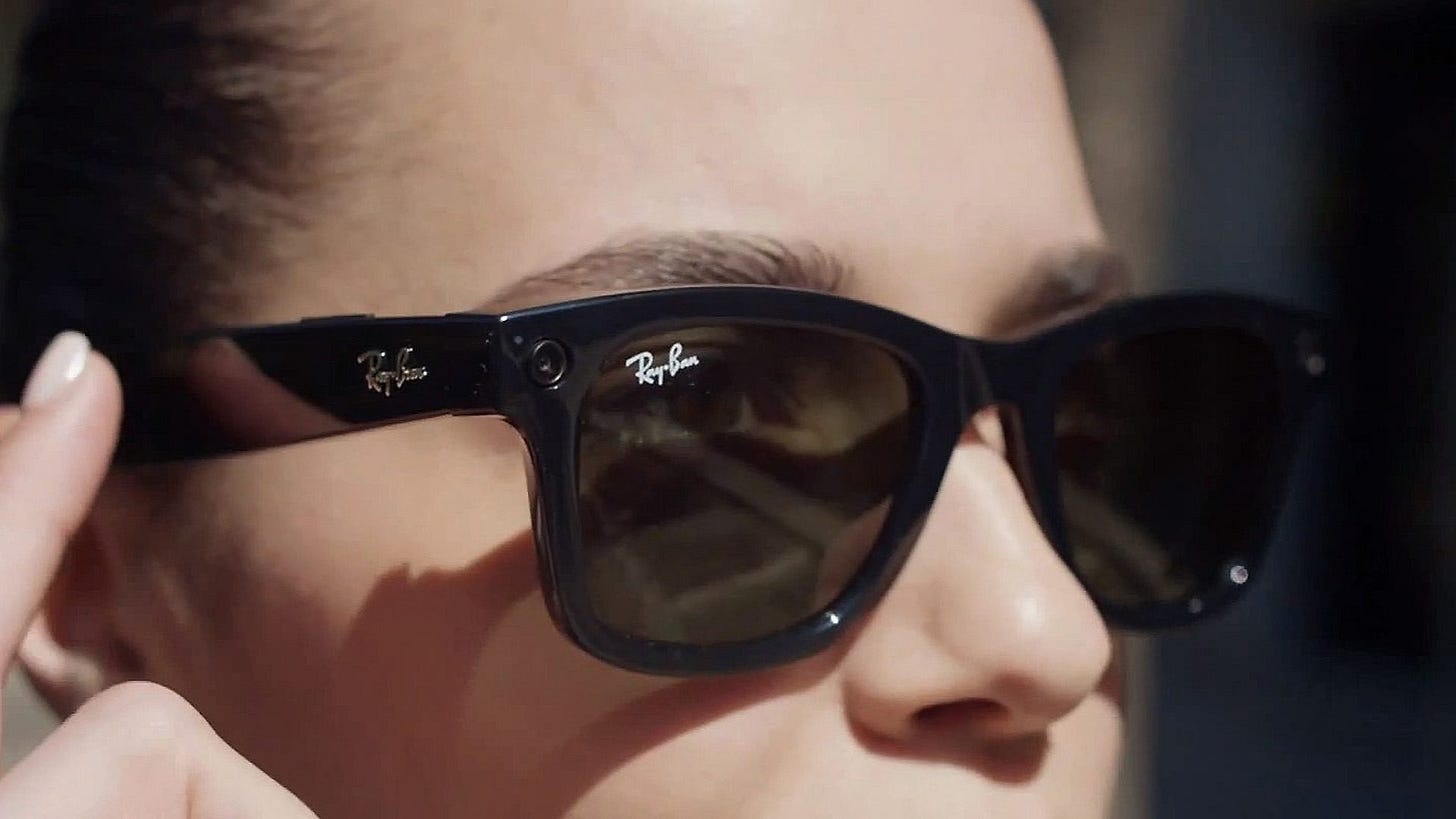Meta's Latest Innovations in AI Sun Glasses and latest news in VR
Meta's Futuristic Sun Glasses Will Make You Rethink Reality
Meta, formerly known as Facebook, has been hard at work developing new virtual and augmented reality technologies that have the potential to revolutionize the way we interact with digital content, communicate with others, and go about our daily lives. This week brought several exciting announcements from Meta about their latest efforts in VR, AR, and smart glasses.
Meta's Partnership with Ray-Ban for Smart Glasses
One of the biggest reveals was Meta's partnership with the iconic eyewear brand Ray-Ban to create Ray-Ban Stories - a stylish pair of smart glasses with built-in speakers and cameras. The glasses allow you to listen to music, take photos and videos, and make calls completely hands-free by using voice commands.
The glasses connect to your smartphone via Bluetooth or WiFi and are equipped with two front-facing 5MP cameras for snapping photos and 30-second videos which can then be uploaded and shared on social media through the Facebook View app. A discreet open-ear speaker provides immersive audio so you can listen to music, podcasts, and take calls without headphones.
The Ray-Ban Stories smart glasses just launched this month and are available in 20 style options starting at $299. The partnership represents Meta's first foray into developing mainstream consumer tech devices beyond virtual reality headsets and video calling gadgets. It provides an easy entry point to intelligent eyewear for the average user.
Horizon Workrooms - VR for Remote Collaboration
In addition to their smart glasses launch, Meta also recently debuted Horizon Workrooms - a virtual reality app that allows users to meet with remote colleagues in a shared VR workspace.
The app works with Meta's Oculus Quest 2 headsets and uses your desk and keyboard in real life while transporting your upper body, facial expressions, and gestures into a computer-generated meeting room in VR. Up to 16 people can join a Workrooms meeting space together where they appear as avatar versions of themselves seated around a virtual conference table.
Workrooms users can view shared screens, collaborate on virtual whiteboards, or have more casual conversations using VR hand tracking and facial expressions. The app aims to make remote work and collaboration feel more immersive, reducing the fatigue of video calls. Early reception from remote workers participating in beta trials has been positive so far.
Continued Investment in VR/AR Technology
Meta is going all-in on virtual and augmented reality tech - investing $10 billion in the sector this year alone. They predict the metaverse - a network of persistent, interconnected 3D virtual worlds - will soon revolutionize work, entertainment, and social connection.
Meta's CEO Mark Zuckerberg called Workrooms "an early glimpse of the metaverse" and said the company is developing multiple new products to make VR productivity apps more ubiquitous. Meta wants to make interacting in virtual reality feel as natural as being together in a physical room.
In addition to VR headsets and smart glasses, Meta is also working on augmented reality tech that overlays digital content onto the real world. They recently unveiled a prototype AR headset called Project Nazare that shrinks AR hardware down to the size of reading glasses. Nazare features thin holographic lenses and is being designed to enable natural conversational interactions between people and AI.
Meta believes AR could one day offer real-time language translation during in-person conversations for people speaking different languages. They hope Nazare will expand the utility of AR glasses for work collaboration and eventually replace smartphones altogether.
The Future is Exciting - and Coming Soon
It's an incredibly exciting time as Meta and other tech giants like Apple and Google race to turn sci-fi visions of the future into reality. The computing paradigms and ways we connect with each other are evolving rapidly.
While Metaverse virtual worlds and AR glasses that overlay digital content onto real life may still sound far-fetched, the technology is clearly progressing faster than many ever predicted. Products like Ray-Ban Stories smart glasses and VR collaboration apps like Horizon Workrooms provide tangible glimpses of how virtual and augmented reality are poised to change our lives in the very near future.
The implications for how we work, play, learn, and interact with our environments in immersive new ways are profound. VR and AR technologies are advancing quickly from the realm of research labs to real-world consumer products thanks to Meta's massive investments. We're on the cusp of a new computing revolution - and it's going to be an exciting ride.
In closing, Meta's recent announcements show they are charging full steam ahead with virtual and augmented reality platforms that will shape the imminent future. While smart glasses and VR collaborations are just getting started, Meta is already planning far-reaching advancements. The metaverse and immersive presence technologies Meta envisions go beyond anything we've seen before. One thing is clear - the way we experience technology and each other is about to change dramatically. The future is coming - faster than many of us ever anticipated.







